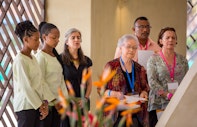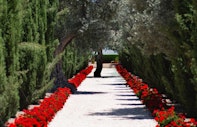What Bahá’ís Believe
The Life of the Spirit
Devotion
Meditation
- What Bahá’ís Believe
- Overview
- Bahá’u’lláh and His Covenant
- The Life of the Spirit
- God and His Creation
- Essential Relationships
- Universal Peace
- What Bahá’ís Do
The capacity to meditate is a distinguishing feature of the human being. Indeed, human progress—spiritual, material, or social—would be impossible without reflection and contemplation. Bahá’u’lláh states: “The source of crafts, sciences and arts is the power of reflection.”Tablets of Bahá’u’lláh, Kalimát-i-Firdawsíyyih
The Bahá’í writings do not prescribe any fixed procedures for meditation. However, it is clear that whatever its form, it entails focused reflection. Through meditation, the individual is able to gain new and valuable insights into abstract and practical matters. Yet, placing too much emphasis on every idea that comes to mind during this process proves to be counter-productive. Some thoughts may be of little or no use; they are “like waves moving in the sea without result. But if the faculty of meditation is bathed in the inner light and characterized with divine attributes, the results will be confirmed.”‘Abdu’l-Bahá, Paris Talks
“Recite ye the verses of God every morn and eventide” is a counsel of Bahá’u’lláh vital to the pattern of Bahá’í life. Yet He admonishes us not to pride ourselves on the volume of holy writings that we may read, stating that “were a man to read a single verse with joy and radiance it would be better for him than to read with lassitude all the Holy Books of God”.Bahá’u’lláh, The Kitáb-i-Aqdas In the same passage, He cautions against reading sacred verses in a way that may lead to weariness: “Lay not upon your souls that which will weary them and weigh them down, but rather what will lighten and uplift them, so that they may soar on the wings of the Divine verses towards the Dawning-place of His manifest signs; this will draw you nearer to God, did ye but comprehend.”Bahá’u’lláh, The Kitáb-i-Aqdas
The daily practice of reading from the holy writings provides a natural opportunity to meditate on profound concepts and to reflect on how they might be applied to one’s own life and character, as well as efforts to contribute to the progress of society. Such meditation assists one to heed Bahá’u’lláh’s advice to “let each morn be better than its eve and each morrow richer than its yesterday.”Tablets of Bahá’u’lláh, Law-i-Hiqmat









